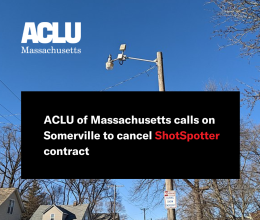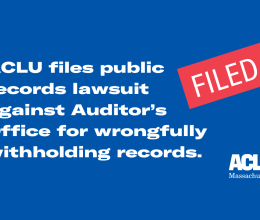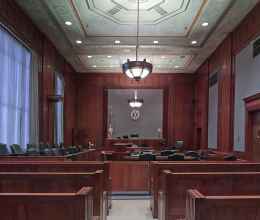
Victory! Ruling in favor of the ACLU of Massachusetts, Federal District Court Judge Allison Burroughs on August 17, 2016 ordered the FBI to disclose staffing and budget information for the Massachusetts Joint Terrorism Task Force, as well as the number of active/open FBI investigations in Boston as of 2014. The Court also ordered the US Attorney's Office to search its own records for the same information, something it had been unwilling to do. This decision represents a victory for transparency and for Massachusetts residents, who will finally have a chance to learn more about how the JTTF and FBI operate in the Commonwealth.
What has the ACLU done, and why?
In April 2014, the ACLU of Massachusetts sued the FBI and U.S. Attorney Carmen Ortiz to learn more about Massachusetts participation in secretive federal-state-local teams known as Joint Terrorism Task Forces (JTTFs).
JTTFs have wide-ranging powers to investigate people and groups, yet little is known about how they function and to whom they are accountable. In December 2013, the ACLU of Massachusetts requested government documents under the Freedom of Information Act about the task forces’ structure, participating agencies and budget. We also sought the number and types of investigations conducted by the Boston FBI field office, as well as documents relating to Ibragim Todashev, the Tsarnaev associate who was killed by a JTTF agent. When both the FBI and the U.S. Attorney’s office failed to provide documents, we filed a lawsuit in federal district court.
The FBI argued that it could withhold documents such as staffing and budget information, the number of parking spots allocated to JTTF members, and the maximum overtime pay under a “law enforcement” exemption in FOIA, stating that if it released this information “criminals would have an idea as to where the FBI is focusing its limited resources.”
The US Attorney’s office had refused to search for the requested documents at all, arguing that it would have simply duplicated the FBI’s efforts.
What did the Court rule?
On August 17, 2016, Judge Burroughs rejected the government’s arguments. With respect to the FBI, the court ruled that the budget and staffing information must be disclosed because it “does not disclose how the Massachusetts JTTF actually goes about investigating crimes.” And, while allowing the FBI to withhold specific information about what activities trigger specific types of investigations, it ordered it to release the total number of active/open FBI investigations.
The court also ordered the US Attorney’s Office to conduct a search for the documents, ruling that it has own obligation under FOIA to conduct a search, regardless of the fact that the FBI was also conducting a search for the same documents.
Media
- Judge orders FBI, Ortiz to turn over documents on Mass. Joint Terrorism Task Forces
- PrivacySOS: Judge deals blow to FBI, DOJ secrecy over terror task force operations
- MuckRock: Requester's Voice: Laura Rótolo on suing the FBI and Justice Department for Boston Marathon documents
- WBUR: What it really means to be safe in a democracy
- Vocativ: Did NSA-Style Snooping Blind the FBI to Boston’s Bombers?
- Boston Magazine: ACLU Sues FBI, Carmen Ortiz for Details on Ibragim Todashev Shooting
- WGBH: Mass. ACLU Sues FBI, US Attorney In Todashev Case
- WBUR: ACLU Sues For FBI Records On Terrorism
- Boston Globe: Mass. ACLU seeks federal data on bombing






